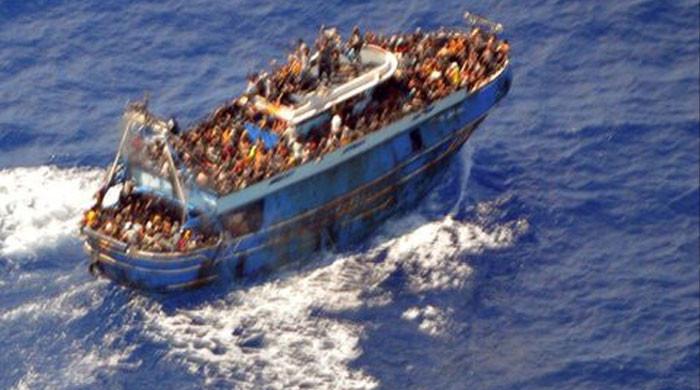 |
| A representational image provided by the Hellenic Coast Guard shows migrants onboard a boat during a rescue operation, before their boat capsized on the open sea, off Greece, June 14, 2023. — Reuters |
UN Launches Pakistani Migration Network to Combat Trafficking and Smuggling
UN Launches Pakistan Network to Combat Human Trafficking and Migrant Smuggling with Unified ApproachThe UN, with IOM, launches Pakistan UN Network on Migration to bolster governance, curb human trafficking, and support victims. Nationwide campaigns, hotlines, and legal reforms underpin this holistic effort.
A representational image provided by the Hellenic Coast Guard shows migrants onboard a boat during a rescue operation, before their boat capsized on the open sea, off Greece, June 14, 2023. — Reuters ISLAMABAD: In a bid to combat human trafficking and enhance migration governance, the...
In a landmark effort to safeguard vulnerable individuals, the United Nations has inaugurated the Pakistan UN Network on Migration (UNNM)—a robust platform designed to strengthen migration governance and stem the tide of human trafficking and smuggling. The initiative, unveiled by UN Resident Coordinator Mohamed Yahya, marks a significant leap toward secure, orderly, and humane migration.
The formal launch also introduced Pakistan’s first Migration Multi-Partner Trust Fund, aimed at supporting national efforts on migration management and bringing together government, civil society, and international organizations under a collective, whole-of-society approach. The International Organization for Migration (IOM) will coordinate and serve as the network's secretariat, while the UN Resident Coordinator chairs its steering group.
A compelling highlight came from a returning migrant, Moazzam Ali, whose successful reintegration story underscored the initiative’s human impact: “Life makes us move—but journeys should become easier and more dignified.” This statement illustrated the transformative potential of such collaborative frameworks.
More Than Just a Network
The UNNM is more than an administrative construct—it provides a reliable ecosystem for coordinated policymaking, legal enforcement, and societal support. Rooted in global frameworks such as the 2030 Agenda for Sustainable Development and the Global Compact for Safe, Orderly and Regular Migration (GCM), the network strengthens the link between migration governance and national development agendas.
Pakistan’s leadership—including participation from ministries, the National Commission for Human Rights, IOM, and civil society—underscored a shared commitment to crafting policy responses that reach beyond containment to compassion and protection.
How Awareness Campaigns Build Ground-Up Support
Complementing the UNNM’s structural efforts, ground-level campaigns are transforming public awareness and response mechanisms.
Led by UNODC and the FIA, a nationwide campaign has rolled out awareness drives across 31 trafficking hotspots—spanning Punjab, Sindh, Balochistan, Khyber Pakhtunkhwa, Azad Jammu & Kashmir, and Gilgit-Baltistan. Evaluations in early 2023 revealed startling gaps in public knowledge: only 55% had heard of human trafficking and just 9% understood the laws criminalizing it.
To bridge this gap, over 6,000 banners, 1 million brochures, and 2 million mobile messages have spread critical information on identifying trafficking, accessing legal support, and understanding victim rights. Radio messages and public service videos have also played key roles in reaching rural and underserved communities.
Simultaneously, UNODC and FIA have hosted media workshops to empower journalists with tools for survivor-centric, ethically driven reporting. The goal: accurate legal framing, sensitivity to trauma, and dismantling of sensationalist narratives. Journalists were trained to use correct terminology and understand TIP vs. migrant smuggling distinctions.
Strengthening Helplines and Legal Mechanisms
On the enforcement front, Pakistan has strengthened its ability to respond swiftly to cases of trafficking and smuggling. The FIA, with support from the ILO and Australian funding, launched the first TIP (Trafficking in Persons) hotline connected to a Management Information System (MIS), enabling instant referrals and support for victims.
Additionally, the ILO’s Phase II TIP Reporting Enhancement project is expanding this framework, improving data reliability and referral efficiency across provincial and federal law enforcement units.
At the legislative level, the Senate has revised key laws—strengthening penalties, expanding legal definitions (including criminalizing organized begging), and mandating jail time for smugglers. These amendments reflect a zero-tolerance stance and readiness to deter traffickers.
Civil Society and Partnerships Amplify Impact
Public-private collaboration is essential to combat trafficking effectively. Conferences organized by UNODC, FIA, and partners have shared knowledge, fostered multi-sectoral coordination, and reinforced national action plans. Civil society organizations, including those focusing on women’s rights and child protection, are playing a critical role in providing grassroots support and advocacy.
Among the country’s most respected advocates is Ansar Burney, whose decades-long efforts have supported thousands of trafficking victims. His Trust continues to offer psychological, legal, and repatriation assistance to those trapped in abusive systems.
Why This Matters—and What Comes Next
Pakistan is both a source and transit country for irregular migration, with tragic boat tragedies and smuggling networks continuing to claim lives. Against this grim backdrop, the UNNM and associated initiatives offer a blueprint for a safer future—one where migration is indeed orderly, lawful, and life-preserving.
By weaving together regulation, awareness, victim support, and legal deterrence, Pakistan is building a national shield against trafficking. The UN-supported network will improve policy coherence, enforcement coverage, and international alignment—essential in an era where migration is integral to both opportunity and risk.
Tags
National
